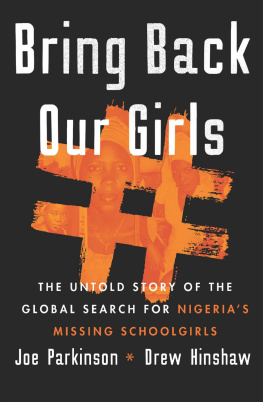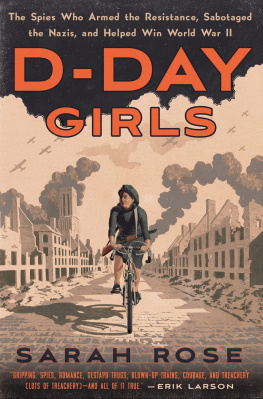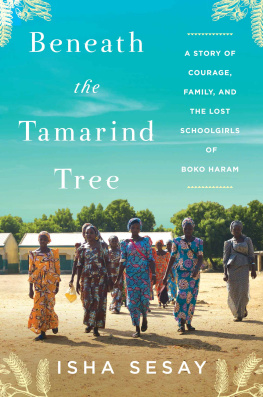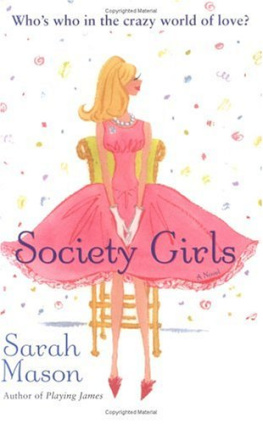
Northeast Nigeria
Map by Daniel Levitt
It is a must for trials to come
But if we stand firm to the end
We will receive the crown
And be like the angels
Mama Agnes
Inflexibility
Partiality
Arrogance
Haste
Impotence
Ignorance
False Promises
The Seven Deadly Sins of Mediation
The following is a work of reporting, conducted over six years and on four continents with hundreds of individuals involved in the search for the Chibok schoolgirls, including twenty of the young women themselves. It is also informed by a firsthand document, a diary, recorded at considerable personal risk during captivity and smuggled into freedom, which has been lightly edited for clarity.
Contents
Title Page
Map of Northeast Nigeria
Dedication
Authors Note
List of Characters
Part I: Kidnapped
1. Gather Outside
2. The Day of the Test
3. The Perfume Seller
4. Kolo and Naomi
5. The Caretaker of an Orphan
6. @Oby
7. Timbuktu
8. #BringBackOurGirls
Part II: An Open-Air Prison
9. The Blogger and the Barrister
10. Thumb-Drive Deal
11. Malam Ahmeds Rules
12. The Mothers March
13. You Must Write One Too
14. Tree of Life
15. The Senators House
16. Maryam and Sadiya
17. These Girls Are Global Citizens
18. Christmas
Part III: A Global Conflict
19. The Foreign Fighters
20. Agents of Peace
21. The General
22. Shadrach, Meshach, and Abednego
23. Sisters
24. The Imam
25. The Escapade
26. The Deadline
27. The Windows Are Closed
Part IV: A Breakthrough
28. Im Not Going Anywhere
29. The Fire
30. Never Trust a Breakthrough
31. Meeting in Manhattan
32. Praise God
33. The One Youve Been Looking For
34. Now There Is Trust
35. Naomi and Kolo
Epilogue
Postscript
Acknowledgments
Glossary
Selected Bibliography
Notes
Index
Photo Section
About the Authors
Copyright
About the Publisher
SENIORS AT CHIBOK GOVERNMENT
SECONDARY SCHOOL FOR GIRLS
Naomi Adamu
Maryam Ali
Sadiya Ali
Saratu Ayuba
Hauwa Ishaya
Lydia John
Rebecca Mallum
Palmata Musa
Ladi Simon
Hannatu Stephen
PARENTS OF CHIBOK STUDENTS
Kolo AdamuNaomis mother
Rifkatu AyubaSaratu Ayubas mother
Mary IshayaHauwas mother
THE MEDIATORS
Tijani Ferobea Quranic scholar and friend of Zannahs
Pascal Holligera Swiss diplomat from the Human Security Division
Fulan Nasrullaha fundamentalistturnedterrorism analyst
Ahmad Salkidaa freelance journalist and prolific tweeter
Tahir Umaran elderly former disciple of Boko Haram leaders
Zannah Mustapha, the Barristera lawyer and orphanage director
NIGERIAN GOVERNMENT
Muhammadu Buhariformer general and president of Nigeria from 2015
Oby Ezekwesiliformer education minister, #BringBackOurGirls protest leader
Goodluck Jonathanpresident of Nigeria, 20102015
BOKO HARAM
Malam Abba, Qaida commander, and the Chibok girls abductor
Malam Ahmed, the Malamthe Chibok girls Islamic teacher and guardian
Ali Doctora Boko Haram physician
Aliyu, Emirul JeshShekaus chief military commander and executioner
Abubakar Shekau, the Imamleader of Boko Haram
Abu Walad, Rijala foot soldier and guard of the Chibok girls
Mohammad YusufThe Martyr, slain founder of Boko Haram
Tasiu, aka Abu ZinniraBoko Harams spokesman
US GOVERNMENT
John Kerrysecretary of state
Barack ObamaPOTUS
Michelle ObamaFLOTUS
John Podestasenior counselor to President Obama
BACKGROUND FIGURES
Mama Agnesa northern Nigerian gospel singer
Jack Dorsey, @Jackfounder and CEO of Twitter Inc.
Amina Rawaram, The last Diva of the Saharaa Maiduguri-based singer popular in the 1960s
Michelle Obama was upstairs in the White House residential quarters, watching the morning news report a story of suffering and social media and wondering whether to tweet. It was May 7, 2014, an overcast Wednesday in Washington, and all the major breakfast shows were leading with the same harrowing tale.
Thousands of miles away, in a remote Nigerian town called Chibok, 276 schoolgirls had been kidnapped from their dormitory on the night before their final exams. Theyd been dozing on bunk beds, studying notes, or reading the Bible by flashlight. They were high-school seniors, a few hours of test questions from graduating as some of the only educated young women in an impoverished region where most girls never learned to read.
Then a group of militants barged in, bundled them onto trucks, and sped into the forest. The students had become captives of a little-known terrorist group called Boko Haram, which filled its ranks by abducting children. The girls parents chased after them on motorbikes and on foot until the trail went cold. For weeks, few people seemed to notice. The schoolgirls looked set to be forgotten, new entries on a long list of stolen youth.
But this time, something mysterious aligned inside the algorithms that power the attention economy. A small band of Nigerian activists on Twitter coined a hashtag calling for the hostages immediate release. Through the unpredictable pinball mechanics of social media, it shot out from West Africa and into the celebrity-sphere boosted by Hollywood and hip-hop royalty, then captured the global imagination. People all over the world began tweeting the same clarion call: #BringBackOurGirls.
The network news channels found the story irresistible. Anchors choked up retelling a tragic sequence of events that seemed to connect the worlds richest and poorest people through the universal pain of parental loss. A class of teenagers had been studying toward a better life, chasing aspirations that made them not so different from ordinary Americans, whose own high schools knew the ever-present danger of adolescent gun violence.
Now these girls were trapped in a ghastly, faintly understood conflict far away, hostage to unambiguous evil. More than that, they needed your help. Here was a chance to take part in the crowdsourced liberation of more than two hundred innocent victims terrorized for their determination to learn.
Watching the news reports upstairs, the first lady felt the same wrench of empathy that millions of others would express online: Those could be my daughters. Michelle dialed her chief of staff. Tina Tchen, a Twitter skeptic, wasnt expecting the call. A lawyer by training, careful and attuned to unforeseen risks, she didnt have an account and wasnt sure that Twitter.com was a presidential-enough platform for the first lady. Once a tweet went live, you couldnt control what happened.
Michelle, too, harbored reservations about social media and how much she should put herself out there. She had never made a major statement on foreign affairs, let alone waded into a war. What if her tweeting about Boko Haram made the situation worse?








